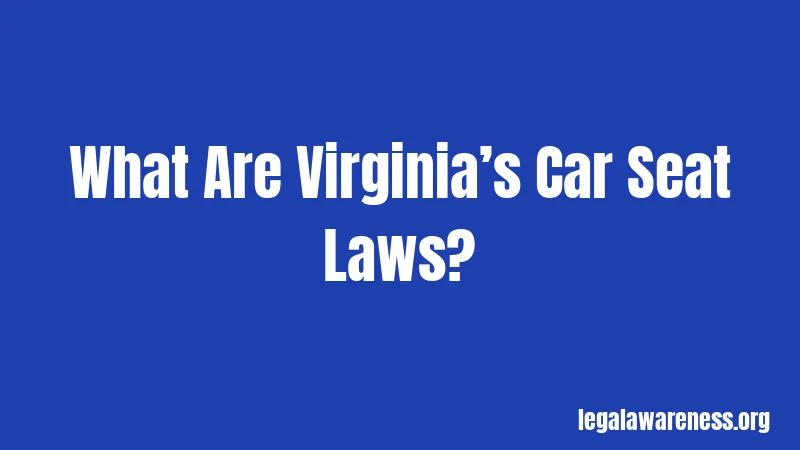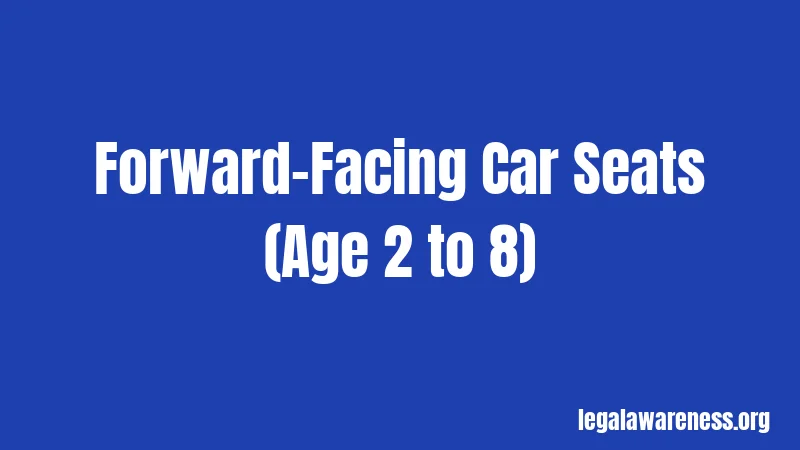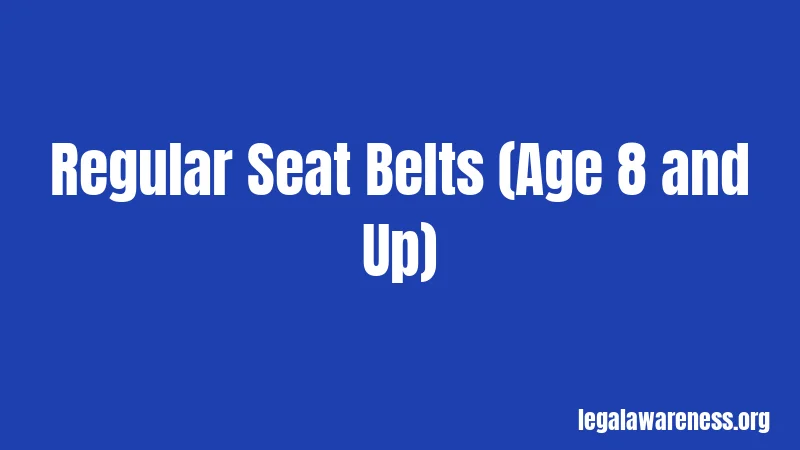Car Seat Laws in Virginia (2026): Keep Your Kids Safe
Most parents think they know the car seat rules. But in Virginia, one mistake can cost you $500. Seriously. The laws are strict, and cops can pull you over just for a car seat violation. Let’s break down exactly what you need to know to keep your kids safe and avoid tickets.
What Are Virginia’s Car Seat Laws?

Virginia requires all children under 8 years old to ride in a car seat or booster seat. No exceptions based on weight or height. The law is simple: under 8 means you need a car seat.
Here’s the deal. Virginia’s law focuses on age, not size. Other states have different rules. But in Virginia, age is what matters most. That said, you still need to follow the manufacturer’s guidelines for your specific car seat.
Rear-Facing Car Seats (Birth to Age 2)
All children must ride rear-facing until they turn 2 years old. This rule changed in 2019 when Virginia updated the law. Before that, kids only had to stay rear-facing until age 1.
Why rear-facing? Babies and toddlers are “head heavy.” Their heads are big compared to their bodies. A rear-facing seat supports the head, neck, and spine better during a crash. It’s just safer.
You have two options for when to switch to forward-facing. Wait until your child turns 2. Or wait until they reach the minimum weight for a forward-facing seat. Check your car seat manual for that weight limit. Newer seats can hold 40 to 50 pounds rear-facing.
Honestly, keeping kids rear-facing longer is better. If your seat allows it, keep them rear-facing past age 2.
Where Does the Rear-Facing Seat Go?
Always put rear-facing seats in the back seat. Never in the front. Never in front of an active airbag.
What if your car has no back seat? You can put the seat in front, but only if you turn off the passenger airbag. Follow your car’s manual to deactivate it properly.
Forward-Facing Car Seats (Age 2 to 8)

Once your child outgrows the rear-facing seat, they move to a forward-facing seat. These seats use a five-point harness. The straps go over the shoulders, around the hips, and between the legs.
Keep your child in a forward-facing seat with a harness until they outgrow it. Check the seat’s height and weight limits. Most forward-facing seats hold kids up to 60 or even 100 pounds.
Pretty straightforward, right?
Booster Seats (Until Age 8)
After outgrowing the forward-facing seat, kids need a booster. The booster lifts them up so the regular seat belt fits right.
A proper seat belt fit means the lap belt sits low across the hips. Not the stomach. The shoulder belt crosses the chest. Not the neck or face.
Virginia law says kids can stop using boosters at age 8. But wait. Many 8-year-olds aren’t tall enough for seat belts yet. Most kids need to be at least 4 feet 9 inches tall for a proper fit.
Wondering if your child still needs a booster? Try the seat belt test. Have them sit in the car seat. Can they sit with their back against the seat? Do their knees bend over the edge? Do their feet touch the floor flat?
If no, keep using the booster. Safety beats convenience every time.
Regular Seat Belts (Age 8 and Up)

At age 8, kids can legally use regular seat belts. But only if the belt fits correctly.
The proper fit checklist:
- Back flat against the seat, not slouching
- Knees bent comfortably over the seat edge
- Feet flat on the floor
- Lap belt low across the hips
- Shoulder belt across the chest, not the neck
If your child doesn’t pass all these checks, stick with the booster. The law says 8 is okay. But safety experts recommend keeping kids in boosters until age 12 or until they’re 4’9″ tall.
Where Kids Should Sit in the Car
Virginia law says kids under 8 must ride in the back seat when using car seats. After age 8, they can legally sit in front.
But here’s the thing. The back seat is always safer. Airbags can seriously hurt kids. The Centers for Disease Control recommends keeping kids in the back until at least age 13.
Never put a rear-facing car seat in the front seat with an active airbag. This is super important. The airbag can deploy at 200 mph. That force can kill a baby in a rear-facing seat.
Installing Your Car Seat Correctly
Hold on, this part is important. A $500 car seat won’t protect your child if it’s installed wrong.
Read two manuals. Your car seat manual and your vehicle manual. Figure out how they work together.
You can install the seat two ways:
- Using the vehicle seat belt
- Using LATCH (Lower Anchors and Tethers for Children)
The seat should be tight. Pull on it. If it moves more than one inch side to side or forward, it’s too loose. Tighten it more.
For rear-facing seats, the harness straps should be at or below shoulder level. For forward-facing seats, the straps should be at or slightly above the shoulders. The chest clip goes at armpit level.
Not sure if you got it right? Get a free car seat inspection. Certified technicians in Virginia will check your installation. Call your local fire department or contact Safe Kids Virginia.
Penalties for Breaking the Law
Virginia treats car seat violations as a primary offense. That means cops can pull you over just for seeing a car seat problem. They don’t need another reason.
First violation: $50 fine Second or later violations: Up to $500 fine
Yep, that’s all you need to know about the money part. But wait, there’s more. If your child has a medical exemption and you don’t carry the written statement, that’s another $20 fine.
All the money from these fines goes to a special fund. That fund buys car seats for low-income families. So at least the money helps other kids stay safe.
Who Needs to Follow These Rules?
Anyone driving a child in Virginia. Parents, grandparents, babysitters, friends. Doesn’t matter. If you’re transporting a kid under 8, you need a proper car seat.
The law applies to all vehicles made after January 1, 1968. So basically every car on the road.
Vehicle Exemptions
Some vehicles don’t have to follow car seat rules. Surprised? Here’s the list:
- Taxicabs
- Limousines
- Executive sedans
- Public transportation
- Regulation school buses
- Farm vehicles
Notice what’s NOT on that list? Uber and Lyft. Those count as Transportation Network Companies. They’re not taxis. So car seat laws apply.
If you’re taking an Uber with your kid, bring the car seat. Seriously.
Choosing the Right Car Seat
All car seats must meet Department of Transportation standards. Look for a label that says the seat is DOT-approved.
Buy a seat that’s:
- New or gently used with a known history
- Less than 6 years old
- Not expired (check the expiration date)
- Not recalled (check the NHTSA website)
- Right for your child’s age, weight, and height
Never use a car seat from a crash. Even if it looks fine, it might have hidden damage. Virginia law requires you to replace car seats after accidents that leave your car undrivable.
Installing Tips That Actually Work
Put the seat in the center of the back seat when possible. That’s the safest spot. If it doesn’t fit there, use the passenger side rear seat.
Don’t buy extra accessories that didn’t come with the seat. No aftermarket padding, no toys, no head supports. Those items can interfere with safety.
Make sure the seat sits at the angle stated in the manual. Most infant seats have angle indicators.
Free Help and Resources
Can’t afford a car seat? Virginia has programs to help. Contact the Virginia Department of Health’s Division of Injury and Violence Prevention. Call 1-800-732-8333.
Need help installing your seat? Find a certified technician. Many police and fire departments offer free car seat checks. You can also contact Safe Kids Virginia coalitions in your area.
Special Situations
What if you don’t have a back seat? You can use the front seat. But turn off the passenger airbag first. Check your vehicle manual for instructions.
What about rental cars? Same rules apply. Most rental companies offer car seats as add-ons. Or bring your own.
What if your child has a medical condition? You need a written statement from a doctor. Carry it with you whenever you transport the child. Without it, you’ll get that extra $20 fine.
When to Switch Seats
This confuses a lot of people. Don’t rush to the next seat type. Keep your child in each seat as long as possible.
Switch from rear-facing to forward-facing when:
- Your child turns 2, AND
- They’ve reached the rear-facing weight limit
Switch from forward-facing to booster when:
- Your child outgrows the forward-facing seat’s height or weight limit
Switch from booster to seat belt when:
- Your child turns 8, AND
- The seat belt fits properly
Notice the “AND” in each rule? Both conditions matter.
Common Mistakes Parents Make
Turning the seat forward-facing too early. Keep them rear-facing longer. It’s safer.
Moving to a booster too soon. Use that five-point harness as long as possible.
Stopping the booster at age 8 when the child isn’t tall enough. The law says 8 is okay. But if the seat belt doesn’t fit right, keep using the booster.
Putting the chest clip too low or too high. It goes at armpit level.
Installing the seat too loose. Remember, less than one inch of movement.
Using a car seat that’s too old or recalled. Check those dates and recall lists.
Seat Belt Laws for Older Kids
Kids age 8 through 17 must wear seat belts. Front seat or back seat. Doesn’t matter. Everyone under 18 needs to be buckled.
The driver is responsible. If your teenage passenger isn’t buckled, you get the ticket.
As of July 1, 2025, adults in Virginia must wear seat belts in both front and back seats. Before that, only front seat belts were required for adults. The new law is named after Christopher King, a high school graduate who died in a crash while unbuckled in the back seat.
What Happens in a Crash?
If you’re in a major crash, replace the car seat. Virginia law requires replacement after accidents where the vehicle can’t be driven away.
Even if the seat looks fine, it might have damage you can’t see. The structure could be compromised. Don’t risk it. Get a new seat.
Most insurance companies will pay for a replacement car seat after an accident. Ask your insurance agent.
Rideshare Rules
Uber and Lyft are NOT exempt from car seat laws. This surprises many people. But it’s true.
When you order an Uber or Lyft with your kid, you need to provide the car seat. Most rideshare drivers don’t carry them. Some offer car seat options, but you have to request it specifically.
Basically, if you’re traveling with young kids, bring your own seat.
Other Virginia Child Safety Laws
Virginia also has a law about smoking in cars with kids. If you smoke in a vehicle with anyone under 15, you can be fined up to $100.
The law doesn’t specifically ban leaving kids alone in cars. But you can’t leave a child in a car if it puts their health or safety at risk. Especially if the engine is running.
The Virginia Department of Social Services recommends never leaving kids under 8 alone in vehicles. Not even for a minute. Heat kills fast.
How to Check Your Seat Belt Fit
This is probably the most important test. Stand by while your child sits in the car.
Ask them to scoot all the way back. Is their back flat against the seat? Good.
Look at their knees. Do they bend naturally over the edge of the seat? Do their feet rest flat on the floor? If yes, continue.
Check the lap belt. Does it sit low across the tops of the thighs? Or is it riding up on the stomach? It should be on the thighs.
Check the shoulder belt. Does it cross the middle of the chest and shoulder? Or is it cutting across the neck? It should never touch the neck or face.
If everything checks out, the seat belt fits. If anything is off, your child needs the booster longer.
Why These Laws Exist
Car crashes are a leading cause of death for kids. Proper car seats reduce fatal injuries by 71% for infants under 1. For toddlers age 1 to 4, the reduction is 54%.
Those numbers are huge. Car seats save lives. Period.
Virginia’s laws align with recommendations from the American Academy of Pediatrics and the National Highway Traffic Safety Administration. These aren’t random rules. They’re based on real research about what keeps kids safe.
Frequently Asked Questions
Does Virginia car seat law apply to out-of-state visitors? Yes. If you’re driving in Virginia with a child, you must follow Virginia’s car seat laws. Doesn’t matter where your car is registered.
What if my child is very tall for their age? Virginia law is based on age, not height or weight. A tall 5-year-old still legally needs a car seat. Follow both the law and the manufacturer’s guidelines for your specific seat.
Can I use a used car seat? Yes, but be careful. Make sure you know the seat’s full history. Check that it’s not expired, not recalled, and never been in a crash. Get the manual if possible.
Do I really need to replace my car seat after every accident? Not every accident. Virginia law requires replacement after crashes where the car can’t be driven away. Safety experts recommend replacing seats after any moderate to severe crash.
What counts as a booster seat? Both high-back and backless boosters count. High-back boosters provide more support and work better in cars without headrests. Backless boosters are okay if your car has a headrest.
Final Thoughts
Virginia’s car seat laws aren’t complicated. Kids under 8 need car seats. Rear-facing until age 2. Then forward-facing. Then boosters. At age 8, they can use seat belts if they fit right.
The penalties are real. The first ticket is $50. After that, it jumps to $500. But honestly, the money isn’t the point. Your kid’s safety is.
Install your seat correctly. Check it twice. Get help if you need it. Keep your child in each seat type as long as possible. Don’t rush to the next stage.
When in doubt, keep them in the safer seat longer. A few extra months in a booster won’t hurt anyone. But switching too early could.
Stay safe out there.
